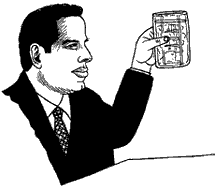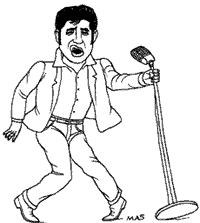
Movies
A Civil Action (Buena Vista Pictures). Critics call this courtroom thriller about a lawyer (John Travolta) on a crusade against a polluting company "perversely undramatic" (Owen Gleiberman, Entertainment Weekly). Some say a miscast Travolta fails to convey the finer points of his character's internal struggles. Most pin the blame on the dreary, endless lawsuit; as David Denby puts it, "a movie that reaches a climax with the hero writing a letter to the Environmental Protection Agency has landed in a certain amount of trouble" (The New Yorker). Richard Schickel of Time disagrees, calling the film "smart, tough, yet curiously moving." (Visit the official site.)
The Thin Red Line (20th Century Fox). Mixed reviews for revered director Terrence Malick's first film in 20 years. The subject matter--a group of World War II soldiers on a mission--strangely echoes Saving Private Ryan, but critics say this film is much more oblique and spiritual. Despite A-list star power (Nick Nolte, Sean Penn, John Travolta, George Clooney) and spectacular cinematography, even positive critics concede the film is "too dark and cluttered and mysterious to ever achieve the popular acceptance of Spielberg's movie" (Dave Kehr, the Daily News). The biggest complaints are about the film's lack of plot and dialogue (almost all the speaking in the film is voice-over), which borders on becoming "precious, self-conscious and even self-indulgent" (Kenneth Turan, the Los Angeles Times). (This unofficial site has photographs from the film and message boards; or you can read about the practical joking on the set here.)
Down in theDelta (Miramax Films). Poet Maya Angelou tries her hand at directing, and the critics are pleased with the result. Alfre Woodard plays a floundering single mother in Chicago who returns to her Southern roots and, with the help of a supportive extended family, puts her life back together. Reviews praise Woodard's nuanced performance and call the film "uplifting, and unapologetically so" (Kevin Thomas, the Los Angeles Times). Although it borders on becoming "a cinematic Hallmark card of familial togetherness" (Stephen Holden, the New York Times), most critics find the story emotionally powerful and refreshingly upbeat. (Check out the official site.)
Hurlyburly (Fine Line). Critics call this depressing coke-fueled vision of '80s Hollywood lowlifes more an actors' showcase than a drama: It's "a tedious circus of apoplectic speeches and explosive thespian snit fits" (Lisa Schwarzbaum, Entertainment Weekly). Sean Penn and Kevin Spacey both give keen performances as strung-out movie-biz sharks, but most of the film is just talk (it was adapted from David Rabe's play), with a few bits of sex and violence the only action. Janet Maslin, however, says the film is a "misanthropic triumph" and that "[t]he ensemble acting surpasses that of any other film this year" (New York Times). (See the trailer.)
Theory of Flight (Fine Line). Helena Bonham Carter plays a feisty young woman with Lou Gehrig's disease who is determined to lose her virginity, and Kenneth Branagh is the slightly loony, impotent artist who is her caretaker. Critics complain that this is a "mawkish tale ... without surprises" (Kehr, the Daily News) and recommend that moviegoers "cancel reservations on this Flight and buy a ticket for a film that goes someplace more unexpected and entertaining" (Dennis Moore, USA Today). Thomas of the Los Angeles Times dissents, praising the film's "steady grace" and "blithe spirit." (Visit the official site.)

Books
Careless Love: The Unmaking of Elvis Presley, by Peter Guralnick (Little, Brown & Co.). The breathless enthusiasm of Gerald Marzorati's review in the New York Times Book Review ("not simply the finest rock-and-roll biography ever written. It must be ranked among the most ambitious and crucial biographical undertakings yet devoted to a major American figure of the second half of the 20th century") is not quite matched by other reviewers. Yes, this sequel to the spectacular Last Train to Memphis is definitive and meticulously researched; the problem is the story. Elvis' decline was slow, bloated, and painful, and writing about it in an interesting fashion is more difficult than charting the star's dazzling rise was. Nevertheless, reviewers say that Guralnick tells Elvis' story "with eloquent sorrow and muted poignance" (Ken Tucker, Entertainment Weekly). (Click here to check out the Complete Elvis Presley Database, which has photos, a discography, and links.)
The Jew of New York, by Ben Katchor (Pantheon). The latest graphic novel from the author of the acclaimed Julius Knipl, Real Estate Photographer comic strip is praised as "not only something to read but to ponder--an object nearly as strange and striking as the story it contains" (J. Hoberman, the New York Times Book Review). Set in 1830s New York, the book features an eclectic cast of characters--hucksters, one-legged actresses, anti-Semitic pamphleteers, a man who tries to establish a Jewish state in upstate New York--who combine to form "a richly textured, almost Dickensian community" (Alexandra Lange, New York). The New Yorker calls it "a work of singular, surreal vision." (Check out a few samples of Katchor's Knipl strip here.)
Recent "Summary Judgment" columns
- Movie--Patch Adams;
- Movie--The Faculty;
- Movie--Stepmom;
- Movie--Mighty Joe Young;
- Book--Hundred Dollar Holiday, by Bill McKibben;
- Book--The Vintner's Luck, by Elizabeth Knox.
- Movie--The Prince of Egypt;
- Movie--You've Got Mail;
- Movie--The General;
- Book--Blind Man's Bluff: The Untold Story of American Submarine Espionage, by Sherry Sontag and Christopher Drew, with Annette Lawrence Drew;
- Book--Opened Ground: Selected Poems, 1966-1996, by Seamus Heaney;
- Book--The Unknown Matisse: A Life of Henri Matisse, The Early Years, 1869-1908, by Hilary Spurling.
- Movie--Shakespeare in Love;
- Movie--Star Trek: Insurrection;
- Movie--Rushmore;
- Movie--A Simple Plan;
- Movie--Jack Frost;
- Television--The Tempest (NBC);
- Theater--The Blue Room, by David Hare (Cort Theatre, New York City).
- Movie--Psycho;
- Movie--Central Station;
- Movie--Hard Core Logo;
- Movie--Little Voice;
- Book--Amsterdam, by Ian McEwan;
- Art--"Edo: Art in Japan 1615-1868" (National Gallery of Art, Washington);
- Theater--Electra, by Sophocles (Ethel Barrymore Theater, New York City).